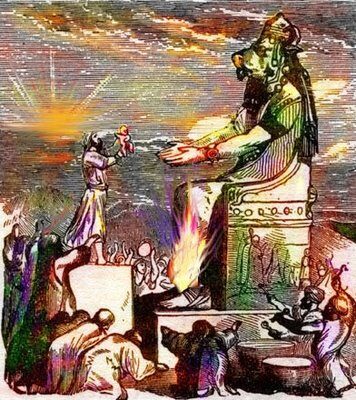On October 11, 2007 AD at 5:30 pm a “A debate, dialogue, and discussion” took place between Christopher Hitchens and Alister McGrath which was entitled “Poison or Cure? Religious Belief in the Modern World.”
Part I: Isaac and Jesus as Sacrifices Part II: Optional or Imposed Soter?
Part III: We Don’t Want it and God Does Not Either
Isaac and Jesus as Sacrifices:
What I wish to address in this essay is something that is typical of the New Atheists and particularly common to Christopher Hitchens. What I am referencing are emotionally charged arguments from outrage that are peppered with fallacious assumptions and inaccuracies.
When I heard, and then read, the statements by Christopher Hitchens that I will here reproduce I empathized with him, I felt a little shot of adrenalin and understood the emotional appeal. However, I could not help but notice that his statement is jam-packed with error. It is at times such as these that we must slow down, take a deep breath, separate the emotional excitement from the determination of accuracy and thusly, dissect the argument.
This is the statement to which I am referring and to which I will respond in a three part essay:
“Yes, of course I’ve emancipated myself from all that nonsense and I wish you would do so, too. I’m saying when you say it’s voluntary, it’s up to you, it’s entirely optional, I don’t think it’s any more optional than Abraham saying to his son do you want to come for a long and gloomy walk, because God seems to be telling me to do something that had better be moral. Otherwise, it would have to be said that God had taken a perfectly normal person and asked him to commit an atrocity. Now where else could that have come from?
Millions of people every year celebrate this act of sadomasochism as if it proved that God loved us so much that he’d make us kill our own children and then he decides to love us so much he’ll kill one of his own.
You [Dr. McGrath] said in a debate with Richard Dawkins that the great thing about God is he knows what it’s like to lose a son.
Now I want you ladies and gentlemen to ponder that expression for just a moment. First, it’s self-evident of, if the story is true, which I don’t think it is, it’s self-evidently not the case, even in the narrative. He doesn’t lose a son, he lends one.
He doesn’t offer one because no one’s demanded it. There’s no problem that has so far been identified in the human species that demands a human sacrifice. For what problem, for what ill is this a cure? There’s no argument, it’s imposed upon you — I’m doing this because the prophets said I would and I’m going to have the boy tortured to death in public to fulfill ancient screeds of bronze age Judaism. But wait, I don’t want it. I don’t need it. I don’t feel better for it. I feel very uneasy about it. Well that’s a pity, because then you’re going to be cast into eternal fire.
This is no way to talk. I don’t like to be addressed in that tone of voice. I don’t want torture, don’t want human sacrifice, don’t want authoritarian blood lettings, smoking temples and altars, incantations of priests around, don’t want it, can’t think of a single thing it will make better about our veil of tears.”
Let us parse the statement and attempt to separate the wheat from the chaff.
For whatever it is worth, let us begin by noting that, as an atheist (actually, self-professed “antitheist”), Christopher Hitchens stands head and shoulders above the overwhelming majority of the billions of human who have ever existed in the history of the world. He, yes he, has emancipated himself from all that nonsense and he can only wish that you would become likewise enlightened, “I hope someday you’ll join us, and the world will live as one”-John Lennon, Imagine.
We will come to the issue of “optional” in part II. It may happened some day and I patiently away for the day when one, even one single, New Atheist demonstrates the least bit of understanding about Abraham being asked to sacrifice Isaac. I am not stating that I expect them to elucidate esoteric minutia but to simply read the text in order to ascertain what it actually states, perhaps have the slightest bit of knowledge of the historical context and, and this is key, accurately represent what the text states.

Succinctly stated: Abraham is told by the God whom he is just getting to know that he should sacrifice Isaac. Abraham does not question it because according to the worship systems de jour this was standard operating procedure. Abraham sets out to carry out the sacrifice (even while indicating that he understood that Isaac would not die1). God ends up telling Abraham to not sacrifice Isaac. Thus, God, the God of the Bible, proves from the outset in His dealings with the Father of Judaism (and by extension, Christianity and by further extension, Islam) that He is not like the other gods and does not accept human sacrifice. It is also very noteworthy that the whole episode is saturated with symbolism which I have drawn out in the Some Jewish Comments and Symbolism section of this essay.
I have dealt with this issue in a few essays already and if you are interested you will get a fuller understanding of the issues involved by reading my response to Prof. Richard Dawkins’ mishandling on this text in my essay, Planting God More Firmly on His Throne.
Also see the “Child Sacrifice: Sanctioned and ‘the right thing to do’?” section of my essay, Dan Barker’s Scriptural Misinterpretations and Misapplications.
Also, in Dan Barker – On His Agnosis.
Also, the “Children: Beatings, Stubbornness, Mockers and Sacrifice” section of my essay, Positive Atheism – Cliff Walker : Weak Bible Week Poster.
Lastly, the “Atrocious Human Sacrifice” section of my essay, Positive Atheism – Cliff Walker : Relative Ethics and Absolute Condemnations.
While the Bible does describe Jesus as a sacrifice for our sins it is contrived to consider Jesus “a human sacrifice” because human beings did not offer Jesus as a human sacrifice to God, upon an altar, in a temple or any such thing. Jesus was a God sacrifice. Christopher Hitchens states that, “He doesn’t lose a son, he lends one,” apparently playing off of the concept of eternal life according to which death does not end life but only ends life on earth. Of course, the Bible does not use “lose” or “lend” but “gave”-“For God so loved the world that He gave His only begotten Son, that whoever believes in Him shall not perish but have everlasting life” (John 3:16).

